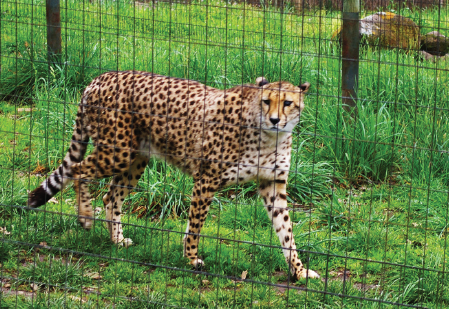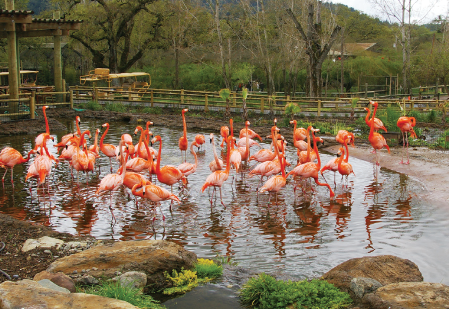It’s not something you’d expect to see in Northern California – free-roaming giraffes, elands, warthogs, and ostriches, among dozens of other exotic African species and nearly 1000 animals that call Safari West their home. This is truly a hidden gem.

Tucked among rolling hills 12 miles east of Santa Rosa, Safari West is a 400- acre private reserve nicknamed the Sonoma Serengeti. In 1993, on what was once an old cattle ranch, founder Peter Lang began offering authentic African safaris. Today Safari West has become a premier destination for travelers, nature photographers, researchers, and school tours, with tens of thousands of visitors each year. The reserve has survived the two major wildfires that swept through the area, successfully protecting the animals.
What makes Safari West unique is that it’s not a zoo, but a non-profit wildlife preservation and advocacy center, plus a research and education facility, fully accredited by the Association of Zoos and Aquariums (AZA), one of only six private facilities in North America to belong to this prestigious organization. Their qualifications include over 40 years of experience in wildlife management and 25 years of conservation education. Over 100 employees and volunteers work together to create a unique experience for both guests and their four-footed and winged charges.
Their goal is to encourage wildlife conservation through first-hand encounters. In a normal year, thousands of children visit. Actually seeing the animals – versus on TV or online – provides a new appreciation and understanding of how many are at risk. Several of the species are critically endangered or even extinct in the wild.
Safari West reopened at the start of March, but it’s a good idea to check their website for the most current status and policies (SafariWest.com). Visitors have an extraordinary opportunity to get close to the majority of animals, riding in modified troop carriers with knowledgeable guides up into the large pastures. Open year ‘round, rain or shine, several daily tours are offered; reservations are required. Safari West is rated by AAA as second only to Disneyland as a ‘must-experience location’ in California.
You can go “glamping” in their comfortable African-style tent cabins that nestle on the hill overlooking the aviary and several pastures. As I stood staring out the mesh-net window, a giraffe and ostrich calmly ogled me, leaving me to wonder who was looking at whom.

Despite my rainy-day visit, our tour guide navigated the muddy roads with ease, frequently stopping to greet the animals by name and answering our questions. Unexpected entertainment came when one particularly amorous ostrich “fell in love” with a passenger and did a mating dance for him.
The tour usually runs two hours, and is preceded by a 45-minute walking tour that includes going into the aviary where you get to be among dozens of species. A fun fact: the flamingoes and other bright pink birds draw their color from betacarotene.
Safari West is also home to both Masai and Reticulated giraffes. I had the wonderful opportunity to visit with these creatures in the giraffe barn, thanks to special tours that permit you to feed these majestic animals. Did you know that a giraffe has a black tongue to protect it from sunburn? It also is surprisingly soft, and their breath smells grassy-sweet.
No, there are no lions, tigers, or elephants. Our guide explained that these among the most dangerous African animals, and would have prevented Safari West from creating a safe environment. There are cheetahs, which have their own large enclosure. Rhinos wallow happily in the mud near the valley’s winding creek – lucky creatures given that many rhino species are being hunted to extinction for their horns. Our guide noted that the horns are just keratin, like our fingernails – yet people kill them under the misguided notion that the horns have aphrodisiac properties.
Reflecting their conservation efforts, about half of their animals were born in the U.S. Safari West has a very successful breeding program, and the monkeys (who live in large enclosed habitats) and the birds regularly produce off-spring, which may then be exchanged with other AZA-approved organizations to prevent over-crowding and maintain genetic diversity.
So, take a safari without leaving California. This is an adventure that you and your family will talk about for years to come!







